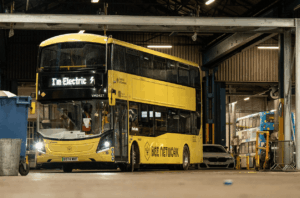A report commissioned by Clean Cities has revealed that transport emissions can be cut by over 90% by the 2030s, with ‘swift implementation’ of well established existing urban transport measures. The first-of-its-kind study modelled five cities from across Europe (Madrid, Greater Manchester, Milan, Brussels and Warsaw).
The measures include: introducing low- or zero-emission zones, greening urban logistics fleets, electrifying the public transport network, expanding cycling infrastructure, and introducing traffic-calming measures.
The report (E)Mission: Zero models four different scenarios representing a range of common decarbonisation strategies – the first prioritising active and public transport, the second electrification, the third combining those two and the fourth being a high-ambition scenario that takes cities close to zero-emission mobility. In the most ambitious scenario, cities would need to go as far as possible on implementing zero-emission zones, electrifying the vehicle fleet and overhauling urban logistics services.
If the most ambitious scenario is achieved, a dramatic reduction in energy demand becomes possible: the combination of electrification, reduced car use and a shift to more energy-efficient transport modes would cut energy use in urban transport by two-thirds.
The report provides critical evidence on how the new climate target recently put forward by the European Commission can be achieved. The target foresees a 90% reduction in greenhouse gas emissions from all sectors by 2040, and an 84% reduction in emissions from domestic transport, which the most ambitious scenario modelled by Clean Cities would make possible. One hundred European cities have set even more ambitious targets and pledged to become climate neutral by 2030 under the EU’s Cities Mission
(Picture – Dreamstime/Michal Bednarek)























